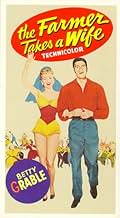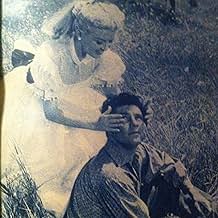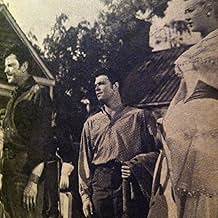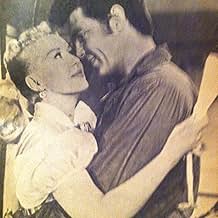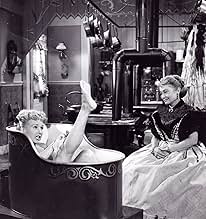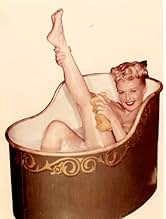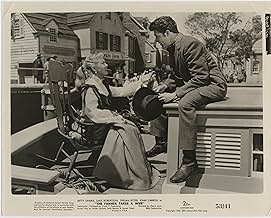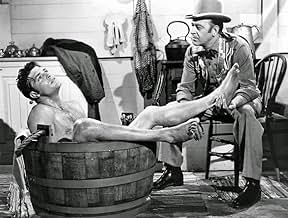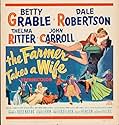A romantic triangle develops on Erie Canal boats in 1850.A romantic triangle develops on Erie Canal boats in 1850.A romantic triangle develops on Erie Canal boats in 1850.
Abdullah Abbas
- Townsman
- (uncredited)
Nancy Abbate
- Little Girl
- (uncredited)
Robert Adler
- Townsman
- (uncredited)
Fred Aldrich
- Boater
- (uncredited)
Herman Boden
- Specialty Dancer
- (uncredited)
John Butler
- Drunk
- (uncredited)
Harry Carter
- Boatman
- (uncredited)
John Close
- Boater
- (uncredited)
Featured reviews
Agreeable 20th Century-Fox musical, a remake of their 1935 Janet Gaynor-Henry Fonda comedy-romance, based on the novel and play "Rome Haul", is uncertainly directed, full of static staging, and embarrassed by at least one terrible dance number--but it does have Betty Grable, full of her usual sass and vigor (which this vehicle definitely needs). On the Erie Canal in 1850, a young lovely and her fiancé/business partner run a barge hauling supplies (she cooks, he drinks); she hires a horse-driver to pull the barge, a low-keyed farmer with a sweetheart in Chicago, but when her fiancé is thrown in jail for fighting with the incoming railroad folk, the girl goes into partnership with the handsome newcomer, sparking romance. Director Henry Levin doesn't seem to know anything about staging a musical number on the screen; though the mediocre songs by Harold Arlen and Dorothy Fields are clearly no help to him, Levin hasn't paced the narrative with the energy needed for a musical, and the introductions to each song are creaky with hesitation. "We're in Business", featuring Gwen Verdon (who pops in without an introduction), is the worst of the lot, while the reprise of "Today I Love Everybody" includes a brief vocal by Thelma Ritter that proves the actress can't do everything. Grable and quiet, polite Dale Robertson aren't an exciting match, but his gentle tone cools down her brashness. There's a streak of early feminism in Grable's character when she flatly refuses to become a farmer's wife (without her feelings on the matter even being considered!), which is then abandoned in the face of true love, however she and Robertson look good together. The color is gloppy, and the finale--where Levin apparently chose to move the material back to its stage roots--is perplexing, yet the movie is upbeat and pleasurable despite its faults. **1/2 from ****
This film is one of the Hollywood musicals that marked the end of a particular genre-the romantic, comical romp filled with solid songs sung well by stars like Judy Garland, Doris Day, and Alice Faye. Based on a Broadway play and a 1935 nonmusical film, this half-hearted attempt is more insipid than romantic or comical. Betty Grable, whose charms I have always found elusive, is miscast as a cook on a boat on the Erie Canal, with Dale Robertson (not a great musical talent) as the guy she falls for. Although they are written by the great Harold Arlen and Dorothy Fields, the songs are forgettable. The highlight of the film for me was watching an uncredited Gwen Verdon dance with Grable in the splashy tune "We're in Business."
Typical 1950's Hollywood production. Costumes are not period, zippers, high heeled pumps and pony tails were not part of the 1850's. The men wear dinner jackets with bow ties and everyone's outfit is sparkling clean and starched, despite the fact that they have been working all day plowing, washing and cleaning. Penciled in eyebrows, eyeliner and lipstick a hundred years too early. Betty Grable still looks like a a pin up girl, and Dale Robertson has a pompadour hair style, also why are they using southern accents in Rome NY? This movie is cute but not Betty Grable's best picture by far. Lovely 1950's period piece in long skirts.
A career-killing movie for Betty Grable, who is wasted, along with everyone except Eddie Foy Jr. in this prettified musical version of the movie that made Henry Fonda a star. Dale Robertson plays the farmer, who is a moron, Thelma Ritter is wasted and some fake-looking scenery still leaves one mystified at how people can live in riverfront saloons and on farms and know nothing at all of the facts of life or the baser side of human nature -- it must be those perfectly maintained canal boats with red-striped awnings they travel in. The songs are also pretty poor, including an ode to Schenectady that did not make Rodgers and Hammerstein jealous.
While none of Gable's starring musicals are likely to make any top-100 lists, most of them have fairly good musical numbers and enough plot and comedy relief to get you from one standard to the next. This one doesn't.
While none of Gable's starring musicals are likely to make any top-100 lists, most of them have fairly good musical numbers and enough plot and comedy relief to get you from one standard to the next. This one doesn't.
It's sad that The Farmer Takes A Wife was owned by 20th Century Fox instead of Warner Brothers. Had Jack Warner been in charge he had the right person for the female lead in Doris Day. As it is this musical adaption of the Frank Elsner-Marc Connelly play has a most miscast Betty Grable doing a part that had Doris stamped all over it. When Betty says 'Uticky' it doesn't quite come out right.
The original play ran for 104 performances in the 1934-35 season and was the vehicle that made Henry Fonda a star. In fact producer Walter Wanger took the highly unusual step in bringing Fonda to Hollywood to star in the role that made him. Playing the parts that Betty Grable and John Carroll have in this version are Janet Gaynor and Charles Bickford.
Of course with this being changed to a musical and the billing reflecting it, the emphasis was changed from the male to the female lead. Seeing Dale Robertson as Dan Harrow though, he makes an admirable substitute for Fonda.
Too bad that Harold Arlen and Dorothy Fields didn't write anything memorable in the score. And for the life of me I can't figure why John Carroll who does sing well, wasn't given more to do musically.
The story is an old fashioned rustic one set during the final days of the Erie Canal. Everyone but Betty seems to realize the railroad will eventually put the canal out of business as the major venue of transportation. Still she and soft spoken farmer Robertson do eventually come together as Robertson wins her over Carroll who is a real lout in this film. I can readily see Charles Bickford in that part in the first film version.
At the same time Betty was doing this, Doris Day was doing Calamity Jane over at Warner Brothers in a similar role with much better songs. Maybe with a better score, The Farmer Takes A Wife would have been more memorable.
Still I think it would have needed Doris Day.
The original play ran for 104 performances in the 1934-35 season and was the vehicle that made Henry Fonda a star. In fact producer Walter Wanger took the highly unusual step in bringing Fonda to Hollywood to star in the role that made him. Playing the parts that Betty Grable and John Carroll have in this version are Janet Gaynor and Charles Bickford.
Of course with this being changed to a musical and the billing reflecting it, the emphasis was changed from the male to the female lead. Seeing Dale Robertson as Dan Harrow though, he makes an admirable substitute for Fonda.
Too bad that Harold Arlen and Dorothy Fields didn't write anything memorable in the score. And for the life of me I can't figure why John Carroll who does sing well, wasn't given more to do musically.
The story is an old fashioned rustic one set during the final days of the Erie Canal. Everyone but Betty seems to realize the railroad will eventually put the canal out of business as the major venue of transportation. Still she and soft spoken farmer Robertson do eventually come together as Robertson wins her over Carroll who is a real lout in this film. I can readily see Charles Bickford in that part in the first film version.
At the same time Betty was doing this, Doris Day was doing Calamity Jane over at Warner Brothers in a similar role with much better songs. Maybe with a better score, The Farmer Takes A Wife would have been more memorable.
Still I think it would have needed Doris Day.
Did you know
- TriviaThe press book mentions that a 1-reel production number that was rehearsed for a month and filmed with Betty Grable was cut before release.
- Quotes
Lucy Cashdollar: Don't forget, I'm a five-time widow, and when they died they all left me everything they owned. Rest their souls.
Fortune Friendly: What do you want with me? I'm broke.
Lucy Cashdollar: Well, I figure after five rich husbands, the next one would be on the house.
- ConnectionsFeatured in Merely Marvelous: The Dancing Genius of Gwen Verdon (2019)
Details
Box office
- Budget
- $1,860,000 (estimated)
- Runtime
- 1h 21m(81 min)
- Aspect ratio
- 1.37 : 1
Contribute to this page
Suggest an edit or add missing content

